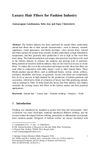
Acidic sandy clay damages archaeological hair the most, while dry conditions preserve but make it brittle; silicone oil can help keep the hair flexible.
27 citations,
February 1991 Cuticle damage doesn't affect hair's tensile strength; the cortex is responsible for it.
7 citations,
January 1995 Silicone pretreatment protects hair from damage and reduces color fading without interfering with bleaching or dyeing.
 6 citations,
January 2016 in “Environmental footprints and eco-design of products and processes”
6 citations,
January 2016 in “Environmental footprints and eco-design of products and processes” The industry should promote pure luxury hair fibers, improve technology, and diversify products to support growers and ensure sustainable use.
 August 2018 in “Journal of The American Academy of Dermatology”
August 2018 in “Journal of The American Academy of Dermatology” Aging significantly affects the hair and scalp of nonbalding Caucasian women, with changes that differ from male pattern baldness.
 August 2016 in “International journal of scientific research in science, engineering and technology”
August 2016 in “International journal of scientific research in science, engineering and technology” Adding human hair fibers to soft soil makes it stronger and prevents cracking.
Yak hair stretches mainly due to macromolecules slipping past each other.
 51 citations,
July 2013 in “Bioorganic & Medicinal Chemistry Letters”
51 citations,
July 2013 in “Bioorganic & Medicinal Chemistry Letters” Compounds from Polygonum multiflorum root, especially a new one, can boost hair growth more effectively than common treatments.
 26 citations,
May 2013 in “Marine Drugs”
26 citations,
May 2013 in “Marine Drugs” Ishige sinicola, a type of seaweed, may help hair grow by blocking a hair loss-related enzyme and boosting important cell growth.
 2 citations,
September 2022 in “Frontiers in genetics”
2 citations,
September 2022 in “Frontiers in genetics” Different proteins are linked to the varying thickness of sheep and goat hair types.
425 citations,
August 2002 in “BioEssays” The cornified cell envelope forms a protective barrier in skin and hair, using specific proteins and lipids to maintain effectiveness.
 32 citations,
June 2013 in “Journal of Investigative Dermatology”
32 citations,
June 2013 in “Journal of Investigative Dermatology” Mice without certain skin proteins had abnormal skin and hair development.
 15 citations,
November 2015 in “Journal of Dermatology and Dermatologic Surgery”
15 citations,
November 2015 in “Journal of Dermatology and Dermatologic Surgery” Mixing platelet-rich plasma with triamcinolone acetonide can potentially improve hair regrowth in alopecia areata patients.
 13 citations,
January 2019 in “Skin appendage disorders”
13 citations,
January 2019 in “Skin appendage disorders” FAPD is a possible diagnosis for hair loss in patients of color and requires multiple evaluations for accurate diagnosis.
10 citations,
February 2014 in “Fitoterapia” Pomiferin may improve skin and hair by increasing important protein production.
8 citations,
March 2010 in “The journal of investigative dermatology/Journal of investigative dermatology” The 14-3-3σ gene is essential for preventing hair loss.
8 citations,
July 2004 in “Journal of morphology” Marsupial hair structure and keratin distribution are similar to placental mammals.
6 citations,
March 2014 in “Livestock science” Researchers created a genetic library from a cashmere goat's skin and found new genes linked to hair growth.
 5 citations,
January 2017 in “Journal of Nanomedicine & Nanotechnology”
5 citations,
January 2017 in “Journal of Nanomedicine & Nanotechnology” Nanoemulgel could be a promising new treatment for hair loss.
 1 citations,
September 2017 in “Journal of Investigative Dermatology”
1 citations,
September 2017 in “Journal of Investigative Dermatology” Hair care products reduced hair roughness, a combination of Stemoxydine and Resveratrol increased hair density, fermented mackerel oil promoted hair growth, and genes TERT and Bmi-1 helped create new hair follicles.
 1 citations,
February 2009 in “Journal of Investigative Dermatology”
1 citations,
February 2009 in “Journal of Investigative Dermatology” Lipase H is important for hair follicle function and shaping hair fibers.

Researchers found genes in sheep that may affect hair growth and wool quality.
 June 2023 in “Yaghag hoeji”
June 2023 in “Yaghag hoeji” Umbraulva japonica extract may help treat hair loss by promoting hair growth phase.
 February 2003 in “Journal of Cutaneous Medicine and Surgery”
February 2003 in “Journal of Cutaneous Medicine and Surgery” Fine hairs improve male pattern baldness treatment, alopecia areata causes remain unknown, and hair can recover from dye damage over time.
Mouse hair follicles grow best in a special medium, especially when cut and from adult mice.
 30 citations,
April 2017 in “Journal of structural biology”
30 citations,
April 2017 in “Journal of structural biology” Human hair keratin fibers have a detailed nano-scale structure that changes with different conditions.
 29 citations,
August 2005 in “Biopolymers”
29 citations,
August 2005 in “Biopolymers” L-cysteine slows down the breaking of bonds in hair due to electrostatic interactions.

Grateloupia elliptica seaweed extract may promote hair growth by activating Wnt/β-catenin signaling and cell proliferation.
Wheat bran promotes hair growth by helping hair cells multiply.
 42 citations,
January 2017 in “Genes”
42 citations,
January 2017 in “Genes” The gene KAP22-1 affects wool yield and fiber shape in sheep.



















